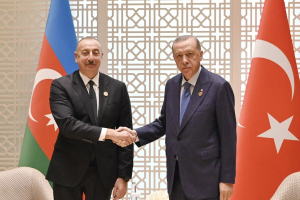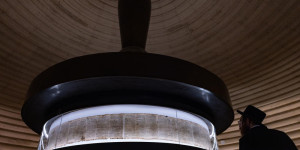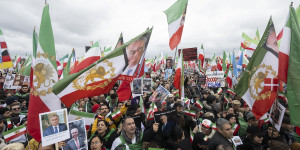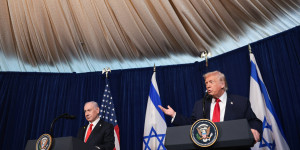What the Armenia-Azerbaijan deal means for Israel, Iran and the region
Trump brokered a deal between the two warring nations, but is peace actually possible?
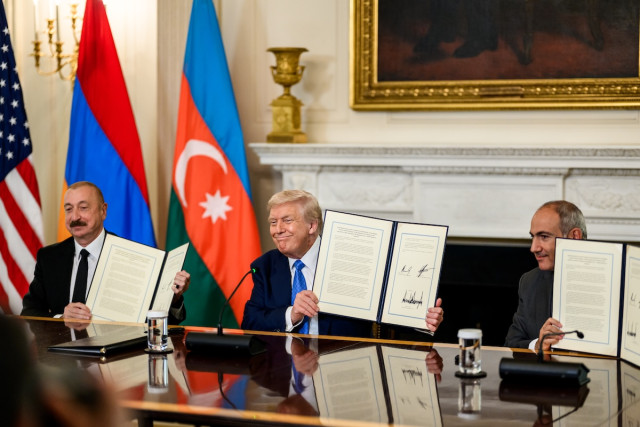
On Friday, U.S. President Donald Trump hosted the leaders of Armenia and Azerbaijan at the White House to sign a deal aimed at ending decades of war and hostilities between the two nations.
Both Azerbaijani President Ilham Aliyev and Armenian Prime Minister Nikol Pashinyan nominated Trump for a Nobel Peace Prize for his administration’s efforts in brokering the deal.
“President Trump, in six months, did a miracle,” Aliyev said.
“We are laying a foundation to write a better story than the one we had in the past,” Pashinyan said.
The deal calls for both nations to refrain from using force, to respect the internationally recognized boundaries set by the Soviet Union and to begin to cooperate economically.
Decades of war between the two nations centered on Nagorno-Karabakh (Artsakh to Armenians), a breakaway republic that falls within current Azeri borders yet had been inhabited by Armenians for centuries. Fighting over Nagorno-Karabakh has led, from both sides, to claims of ethnic cleansing, displacement and the deaths of more than 10,000 over almost four decades.
But in recent times, Azerbaijan decisively won a 2020 outbreak. Then, in 2023 and following a 10-month siege on civilians, it launched a military invasion of Nagorno-Karabakh in September, causing all 120,000 Armenian residents to flee into Armenia proper. Azerbaijan took over all of the region, arrested Armenian political and military officials and took them as POWs to Baku, where many are now standing trial.
With this victory, Aliyev was emboldened to demand more concessions from Armenia and has also insisted that Armenia amend its constitution to erase any claims to Nagorno-Karabakh. The Azeri leader has also referred to Armenia as Western Azerbaijan, indicating his intentions that the entirety of the landlocked nation is part of Azerbaijan.
One of his latest main demands has been for access across Armenian territory.
Chuck Holton, a war correspondent who has covered the region’s conflicts, said, “It is the best bad deal Armenia could have gotten.”
“The Azeris would have taken Syunik by force,” he told ALL ISRAEL NEWS, referring to the southern region of Armenia separating Azerbaijan from Nakhichevan and neighboring Turkey.
GEOPOLITICAL SHUFFLING
The deal itself shuffles the geopolitical chessboard down to the Middle East. It solidifies Azerbaijan’s achievements and Armenia’s losses in the region, according to one analyst who spoke with ALL ISRAEL NEWS.
“We can identify easily the triangle of Turkey, Azerbaijan and Israel gained momentum …simply because Israel and Turkey armed Azerbaijan and helped her get to the point where they defeated Armenia and won the Karabakh region,” said Eldad Ben Aharon, Ph.D., a senior researcher and an expert on Israel's involvement in the Nagorno-Karabakh region.
Armenia is both a loser and a winner, Ben Aharon said.
“This agreement sets in stone Armenia’s defeat in the 2020 war and the ethnic cleansing of 2023, and it upsets Armenians all over the world. They see Pashinyan as a puppet of [Turkish President Recep Tayyip] Erdoğan and Aliyev, and believe he has sold Armenia’s regional position at a very low price,” Ben Aharon observed.
“Nevertheless, this peace deal also advances the democratic reforms initiated in Armenia in recent years and reinforces its Western orientation, most notably through the adoption of the law to launch the EU membership process in March 2025. It also enables Armenia to strengthen cooperation with Washington in the fields of energy, technology, and the economy.”
The agreement reduces Russian influence in the region, increases American sway, and also sets up a possible showdown between Iran and the United States.
“The U.S. is using the vacuum (left by Russia) to create new realities. Iran, formerly Armenia’s most important ally in the region, is also losing its influence, as Armenia signals its alignment with Western powers, the EU and Washington,” Eldad said. “This marks another setback for Iran after the decline of Hezbollah and Syria under [former President Bashar] Assad, with Armenia now slipping away as well.”
Ben Aharon noted that Armenia’s poor choice in allies (Russia and Iran) has forced it to come empty-handed to the bargaining table in the new reality of the region.
THE CONTROVERSIAL CORRIDOR
In a separate agreement reached between Armenia and the United States, also announced on Friday – and probably key to Baku’s acceptance of the peace deal – America will build and oversee a land corridor, which will be called the Trump Route for International Peace and Prosperity (TRIPP). The route will be operated for 99 years by an American company.
The Zangezur Corridor was a contentious issue between Azerbaijan and Armenia and a stumbling block to peace. Aliyev demanded that Baku control the east-west passage, which would have violated Armenian sovereignty. For Azerbaijan, a major producer of oil and gas, the route provides a more direct link to Turkey and then Europe.
Iran shares long borders with Azerbaijan and Turkey, but its only access to Europe has been through its small 27-mile border with Armenia and it has long opposed Azeri aspirations to create a corridor. Ali Akbar Velayati, a senior Iranian official, threatened that “the passage will not become a gateway for Trump’s mercenaries – it will become their graveyard.”
But Matias Perttula, director of Save Armenia, told ALL ISRAEL NEWS he sees this agreement as bringing hope and economic possibilities to Armenia.
“The transit route, if that starts to take shape, it can really bring prosperity not just to Armenia but to the region,” he said. “Armenian law and sovereignty is going to govern over the transit route. The Azeris wanted unimpeded power over the transit route which was unreasonable especially coming from an enemy.”
Despite the hype over the somewhat surprising deal, many advocates for Armenia feel that it shortchanged the first Christian nation. Not mentioned in the agreement were POWs or the right of return for Armenians to Nagorno-Karabakh.
The Armenian National Committee of America (ANCA) didn’t mince words.
“A forced peace deal that ignores the forced displacement of Artsakh’s Armenians, rewards ongoing Azerbaijani occupation, and paves the way for U.S.-backed development of the so-called ‘Zangezur Corridor’ is not a peace agreement – it’s a geopolitical disaster in the making,” the lobby group said in a statement. “Real peace cannot come at the cost of Armenia’s sovereignty or the rights of its people. Until Azerbaijani forces withdraw, POWs are released, and the right of return is secured for displaced Armenians, any agreement signed under pressure is neither fair nor legitimate.”
Blessed with natural beauty but few natural resources, Armenia is still wrestling itself out of the grip of the Soviet era. Geographically, this tiny landlocked nation of only 3 million people separates Turkey (85 million) and Azerbaijan (10 million).
Azerbaijan, a Shia-majority Muslim nation rich in oil, boasts strong ties with Israel, one of its main arms suppliers. Many believe that the Israeli spy agency Mossad uses Israel’s ties with Azerbaijan to spy on Iran.
The mistrust between Armenia and Azerbaijan runs deep, and since Azerbaijan holds the power, many Armenians are fearful that Azerbaijan will not uphold its end of the deal. Also, as Dan Harre of Save Armenia warned, "The peace deal was initialed but not signed."
“It is imperative for the U.S. to keep pressure on Azerbaijan to get the deal across the finish line, as Azerbaijan does not have a history of working with Armenia in good faith,” he said.

Nicole Jansezian is a journalist, travel documentarian and cultural entrepreneur based in Jerusalem. She serves as the Communications Director at CBN Israel and is the former news editor and senior correspondent for ALL ISRAEL NEWS. On her YouTube channel she highlights fascinating tidbits from the Holy Land and gives a platform to the people behind the stories.
You might also like to read this:




